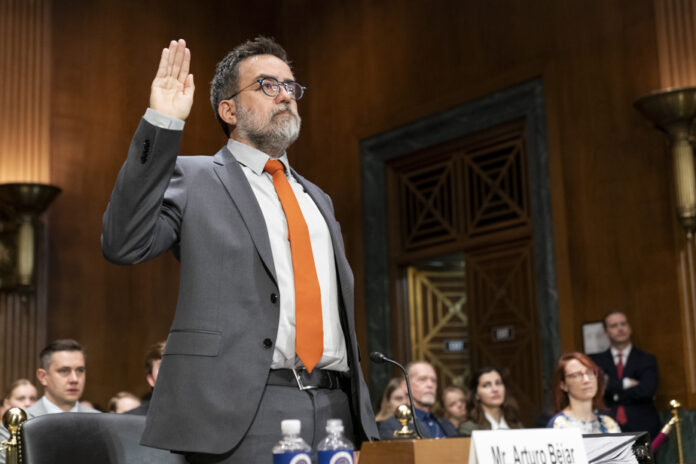On the same day that whistleblower Frances Haugen testified before Congress about the harms of Facebook and Instagram on children in the fall of 2021, a renowned consultant sent an alarming email to Meta CEO Mark Zuckerberg on the same subject.
Arturo Béjar, former director of engineering at Meta and expert in the fight against online harassment, then told Mark Zuckerberg what his own daughter had experienced on Instagram. His concerns and warning went unheeded, he said Tuesday in testimony before Congress.
“I am introducing myself today as a father whose child received unwelcome sexual advances on Instagram,” he told U.S. senators.
While heading engineering at Facebook from 2009 to 2015, Mr. Béjar became known for his work to combat cyberbullying. He thought things were getting better. But between his departure from the company and his return in 2019 as a consultant, his daughter registered on Instagram.
In his 2021 email, reported by the Wall Street Journal, Béjar highlighted the gap between how the company addresses harm and how users – particularly young people – experience it.
“Two weeks ago, my 16-year-old daughter posted a story on Instagram about cars. Someone wrote “Go back to the kitchen”. This hurt her deeply,” he wrote to Mr. Zuckerberg. “That said, this comment is far from violating the norms, and our blocking or deletion tools will let this user go to other profiles, where he will continue to spread his misogyny,” wrote Mr. Béjar, adding that he doubted whether tightening reporting standards or reviewing content more thoroughly will solve the problem.
Mr. Béjar testified Tuesday before a Senate subcommittee on the impact of social media on adolescent mental health. This proceeding seeks to establish whether Meta executives, including Mr. Zuckerberg, were aware of the harm caused by Instagram and whether they chose not to make the necessary corrections.
Béjar says Meta needs to change its platform oversight and target harassment, unwelcome sexual advances and other bad experiences, even if these issues don’t clearly violate existing policies. So sending crude sexual messages to children doesn’t necessarily break Instagram’s rules, but Béjar says teens should be able to say they don’t want them.
On Tuesday, Senator Richard Blumenthal, a Connecticut Democrat who chairs the subcommittee on Privacy and Technology, opened the session by introducing Mr. Béjar as a “highly respected and admired engineer in the industry” who has been hired specifically to protect children, but whose recommendations were ignored.
“What you presented to this committee today needs to be heard by all parents,” added Josh Hawley, Republican senator from Missouri.
Mr. Béjar cited carefully crafted analytics from Meta that show, for example, that 13 percent of users ages 13 to 15 reported receiving unwelcome sexual advances on Instagram in the past seven days.
According to Mr. Béjar, the reforms he proposed would not have had a major impact on the revenues and profits of Meta and other platforms. They are not intended to punish companies, but to help adolescents.
“You heard the company say ‘oh, this is really complicated,’” Mr. Béjar told the AP. No, this is not the case. Just give the teen the opportunity to say “this content doesn’t work for me,” and then use that information to train all the other systems” and improve them.
This testimony comes amid a bipartisan effort in Congress to pass legislation to protect children online.
“Every day, countless people at Meta and beyond work to keep young people safe online,” Meta said. The questions these analyzes raise about user perceptions illustrate part of this effort, and surveys like this have led us to create features like anonymous notifications of potentially hurtful content and comment warnings. Working with parents and experts, we’ve also put together more than 30 tools to help teens and their families have safe and positive online experiences. All this work continues. »
Two weeks ago, multiple U.S. states filed lawsuits against Meta for harming young people and contributing to the youth mental health crisis. Meta is accused of knowingly and deliberately designing features that get children addicted to Instagram and Facebook.
According to Mr. Béjar, a federal law is “absolutely essential” to make these damages “transparent” and to provide adolescents with help and support from competent experts.















